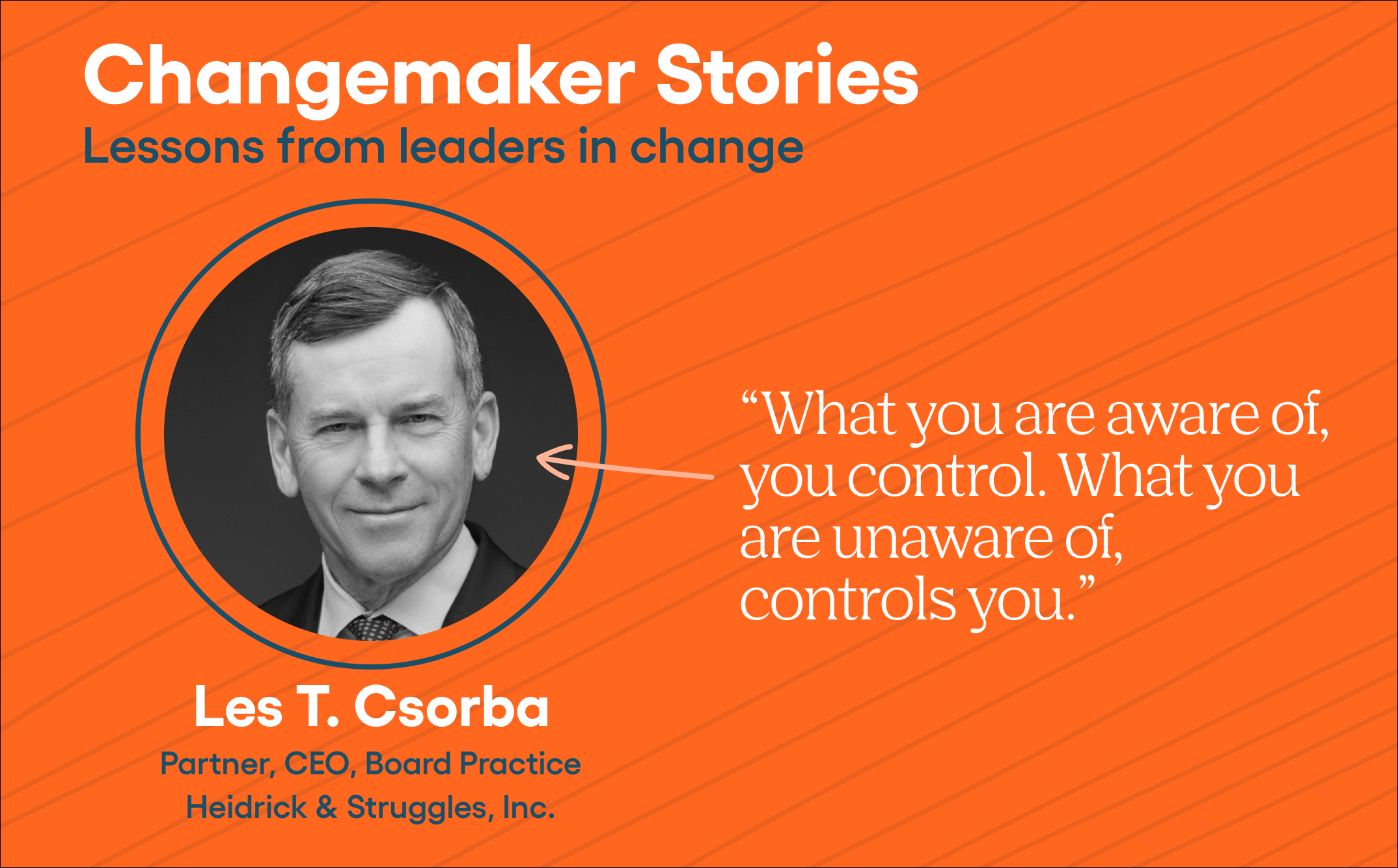

Welcome to Changemaker Stories from LOCAL - an ongoing series of personal interviews with leaders driving change across every industry and discipline. Because change shouldn’t mean going it alone.
This week, we spoke with Les T. Csorba, a lifelong developer of people leaders, philanthropist, and author of ‘Trust: The One Thing That Makes or Breaks a Leader’ and ‘Aware: The Power of Seeing Yourself Clearly - Diary of a Corporate Headhunter.’ In our conversation, Les shared insights on what makes leaders and teams thrive, why self-awareness is non-negotiable for leaders, and how the relationships in his long-time small group continue to provide accountability, grace, and fuel purpose.
My journey in the leadership field began with an internship in Washington, D.C., which eventually led to serving in the White House under President George H. W. Bush in the Office of Presidential Personnel.
I was captivated by meeting with leaders, hearing their stories, and understanding what drew them from the private sector into public service. I truly loved that role.
When that chapter ended in 1993, I entered the executive search industry, better known as headhunting, and I’ve been in the business ever since.
I’m now based in Houston, working in the CEO and Board practice. Most of my work centers on advising boards and leadership teams on CEO and board succession within the energy sector. I also provide CEO and executive coaching, a part of the work I find especially rewarding.
I also recently helped establish and now serve on the board of the Bettering Human Lives Foundation, founded by Chris Wright, the current Secretary of Energy. The foundation’s mission is to address the critical issue of global energy poverty.
Energy poverty is a rarely discussed but critical issue. Today, more than 2 billion people still rely on wood, dung, and charcoal for cooking, a practice that tragically contributes to around 3 million deaths each year (more than cholera, tuberculosis, malaria, and AIDS combined annually).
I see Chris Wright as a true Changemaker, someone with the courage to challenge the status quo in pursuit of solutions. After spending significant time in Africa, he championed the use of propane LPG as a safer and cleaner cooking alternative, a simple innovation that is literally saving lives every day.
A Changemaker is a leader and an innovator, someone who builds solutions and tackles problems head-on. They run toward challenges rather than away from them.
I believe the best Changemakers possess a selfless character, strength of courage, and are committed to something larger than themselves. This can take many forms, from social entrepreneurship or leading a mission-driven business that delivers value to investors while making a meaningful impact in the community.
Today, given the complexity of leadership and the world we live in, no one can drive change alone. True impact comes from leading through teams.
According to our research at Heidrick, the most effective teams share two key qualities. First, they have a clear understanding of the team’s mission. Everyone is aligned, rowing in the same direction, with clarity on what they are working to achieve.
The second key attribute of great teams driving change is a deep understanding of each individual member’s strengths and capabilities. The better team members know one another clearly and know themselves clearly, the more effectively they can drive change and make a positive impact.
“What you are aware of, you control. What you are unaware of controls you.”
We live in a free-market, capitalistic system in America that often emphasizes independence. I believe leaders should push back against this mindset and cultivate interdependency. Too often, leaders think they lead above others, rather than leading among them.
A changemaker is someone who continually grows in leadership, but this can bring a challenge known as the Dunning-Kruger effect: the higher you rise, the more confident you may feel in your self-awareness, even though the opposite is often true.
You have to guard against sycophancy. As a CEO or business leader, your jokes seem funnier, your stories more compelling, but that praise isn’t always genuine. Surrounding yourself with contrarians versus sycophants is the better play.
As leaders rise, it becomes essential to intentionally break down what we call 'The CEO Bubble.' Give those around you permission to provide honest feedback and to challenge you when needed.
“Self-awareness isn’t just about recognizing your flaws, weaknesses, or blind spots. It’s about understanding your strengths and capabilities and transforming them into superpowers.”
I think it’s harder today because of the digital culture we live in. We’re constantly distracted from focusing on the business of you. You are the founder. You are the startup. We need to get busy painting the unfinished canvasses in our life.
I believe it was Mark Twain who said that most men die at 27, and we only bury them at 72. That was written over a century ago, but with constant distraction from digital dopamine, that observation feels even more relevant today.
The community that has likely had the greatest impact on me is my small group. For nearly 30 years, we’ve met every Wednesday to study, share, pray, and do life together, which has included all the pain and joys along the way.
The ten members of my small group are remarkable changemakers, and many are entrepreneurs in their own right, having created billions in value. But even more impressive is how engaged they are in the community, changing the lives of the underserved around us. And yes, between us, we now have over 60 grandchildren!
Are you a Changemaker? We want to hear your story. Let's talk.